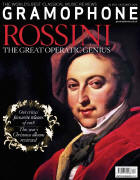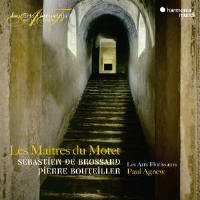Texte paru dans: / Appeared in: |
|
|
Outil de traduction (Très approximatif) |
|
|
Reviewer:
Alexandra Coghlan A collection of French Baroque music without so much as a fan flutter of courtly secularity or a mouthful of cake, this new release from Paul Agnew and Les Arts Florissants flings wide the gates of Versailles and heads out into the regions – to the cathedrals and churches where music of quite another kind flourished during the reign of Louis XIV. Composer Sébastian de Brossard (16551730) may not be a household name but it’s thanks to him that many works from the early decades of the 18th century survive, collected and preserved in manuscripts he presented to the royal library in 1724. This recording pairs Brossard’s own Miserere mei Deus and large-scale Stabat mater with one of the gems of his collection, the Missa pro defunctis of Pierre Bouteiller (c1655-c1717). The harmonised psalm chant of the Miserere, passed here between a soloist and semi-chorus, inevitably draws comparison with Allegri. Less highly coloured in either harmony or ornamentation, Brossard’s setting is nevertheless an attractive work. Neither this nor the Stabat mater, however, truly mines their emotive, penitential texts as we hear Charpentier do in his Leçons de Ténèbres, for example. To all intents and purposes this is pure music, throwing all focus on vocal tone and inflection. Les Arts Florissants are in good company here, with recent recordings by Hervé Niquet and an all-male incarnation of Le Concert Spirituel and David Bates’s La Nuova Musica. The Niquet is an austere affair but La Nuova Musica’s account (complete with superb soloists) is all warmth and drama, eclipsing Les Arts Florissants’ oddly wan and unfocused sopranos by some way. It’s a different story in the Bouteiller, where the group’s blend finds its groove and the singers swell to fill the greater expressive and dramatic space of the work. The comparison here is with Les Voix Humaines’ recording – an intimate, almost domestic account with single voices that works beautifully on its own terms but can’t compete with the aural opulence of this spacious, resonant new recording. |
|




